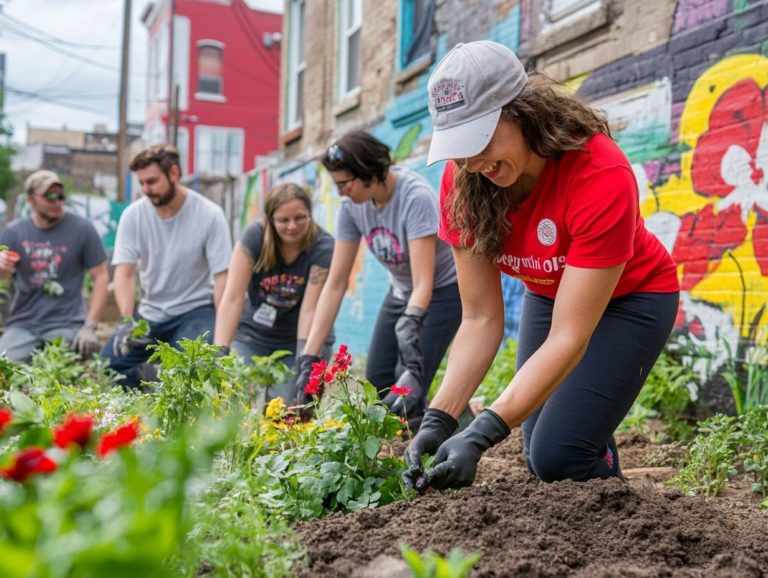Cultural Adjustment: Signs You’re Adapting Well
Cultural adjustment is a journey you may find yourself on, whether relocating to a new country, starting a job in a diverse setting, or engaging with a different community.
Grasping the nuances of cultural adjustment and recognizing the signs of successful adaptation can significantly ease your transition.
This article delves into the markers of positive adaptation, the challenges you might encounter, and practical tips to facilitate your journey. It also emphasizes resources and supportive communities that can assist you along the way.
Prepare yourself to fully embrace your new cultural landscape!
Contents
- Key Takeaways:
- Understanding Cultural Adjustment
- Signs of Successful Cultural Adjustment
- Challenges in Getting Used to a New Culture
- Tips for Culturally Adjusting
- Seeking Support for Cultural Adjustment
- Frequently Asked Questions
- What are some signs that I am adjusting well to a new culture?
- How can I tell if I am experiencing culture shock or just normal cultural adjustment?
- What are some physical signs of cultural adjustment?
- How long does it typically take to fully adjust to a new culture?
- What are some ways to speed up the process of cultural adjustment?
- What should I do if I am struggling to adapt to a new culture?
Key Takeaways:

- Understand and accept cultural differences.
- Feel comfortable, make local friends, and embrace new customs.
- Overcome challenges by keeping an open mind, learning about the culture, and seeking support from community resources.
Understanding Cultural Adjustment
Cultural adjustment is an essential journey you embark upon when navigating the intricacies of a new environment, especially during international travel or relocation. Cultural adjustment has several stages, starting with the initial phase of culture shock, where stark differences in culture may overwhelm you, leading to emotional challenges and a sense of homesickness.
Understanding local customs and social practices not only facilitates your cultural adaptation but also promotes personal growth and resilience. Learning to adapt your behaviors positions you to thrive in diverse settings.
What is Cultural Adjustment?
Cultural adjustment is the process you embark on as you adapt to new cultural environments, facing that initial wave of culture shock think disorientation and stress from unfamiliar practices and expectations.
This journey challenges your understanding of social norms the unwritten rules that govern behavior in society and demands effective coping strategies to manage stress. By actively engaging in the local community and immersing yourself in its customs, you can significantly reduce uncertainty and enhance your comfort levels.
Language acquisition becomes vital here; mastering the local tongue fosters deeper connections with residents and eases communication barriers.
Cultivating resilience is essential; it enables you to bounce back from setbacks, embrace new experiences, and thrive in your new culture. By adopting these proactive approaches, you ll find the transition far smoother, encouraging a richer appreciation of the diverse world around you.
Signs of Successful Cultural Adjustment
You can recognize successful cultural adjustment through several positive indicators. Emotional resilience stands out as a key trait, along with your ability to build social networks that offer vital emotional support.
These elements enhance your experience and contribute to a more robust cultural identity within your new environment.
Positive Adaptation Indicators

Positive adaptation indicators reveal themselves in various ways, such as your enhanced emotional resilience, active participation in local customs, and the development of supportive social networks that facilitate your personal growth.
These networks do more than just offer companionship and encouragement; they become platforms for exchanging ideas and gaining a deeper understanding of diverse perspectives. As you immerse yourself in your new surroundings, you re likely to encounter mentors or like-minded peers who can help you navigate the complexities of cultural adaptation.
Engaging in community events boosts your sense of belonging and fortifies your emotional well-being. Access to communal resources like workshops and group activities fosters skill development and instills a sense of agency. This ultimately catalyzes deeper involvement in the community, enriching your overall life experience.
Are you ready to make lasting connections in your new community? Dive into your new culture and embrace each experience!
Challenges in Getting Used to a New Culture
Navigating the challenges of getting used to a new culture can bring forth a host of emotional hurdles. You may find yourself grappling with feelings of isolation and battling homesickness. These feelings can impede your ability to acclimate to a new environment.
Common Difficulties and How to Overcome Them
Facing the challenges of cultural adjustment can feel like a complex maze. Miscommunication often arises from differing cultural expectations and unique eating and sleeping habits. To effectively navigate these difficulties, employ coping strategies and seek emotional support.
You may find yourself surrounded by unfamiliar customs, leading to feelings of isolation and confusion. To counteract this, join local community groups or participate in cultural exchange programs. These opportunities can create a sense of belonging. Actively communicate with friends or family about your experiences and feelings to establish a crucial emotional support system.
Building relationships with local residents not only enriches your understanding of the new environment but also helps cultivate a supportive network. This makes your transition smoother and more enjoyable.
Tips for Culturally Adjusting
Getting used to a new culture can be greatly enhanced by adopting effective coping mechanisms and immersing yourself in the local culture. This approach eases your transition and fosters deeper connections within the community.
Strategies for Smooth Adaptation

To navigate a new cultural landscape with ease, embrace local customs and build social networks. Focus on mental readiness through language acquisition and self-awareness.
This approach deepens your understanding of the environment and nurtures authentic connections within the community. Engage with local traditions by participating in festivals, attending workshops, or volunteering. These activities unlock opportunities for new friendships and invaluable support systems during your transition.
Actively seek opportunities for cultural exploration to foster personal growth and broaden your perspectives. Stay open to experiences, ask questions, and find mentors among residents who can provide valuable insights.
Ultimately, adaptation is not just a solitary endeavor; it s a shared experience that flourishes through connection.
Seeking Support for Cultural Adjustment
Seeking support for cultural adjustment is essential as you navigate the emotional challenges that come with it. Numerous resources and communities are available to assist you, fostering cultural sensitivity the awareness of and respect for different cultures and nurturing your emotional well-being.
Resources and Communities for Assistance
Various resources and communities, such as UC Berkeley’s I-House and University Health Services, can significantly enhance your cultural adjustment process. They provide essential support systems and encourage cultural exploration.
These institutions offer a broad array of workshops and counseling services tailored to address the unique challenges you may face as a newcomer. Local community engagement programs can be incredibly beneficial, connecting you with diverse cultural activities and volunteering opportunities that foster social networking.
Online forums and social media groups further enrich these initiatives. They offer platforms for you to share experiences and advice with peers. By leveraging these resources, you promote your emotional well-being and cultivate meaningful relationships, ultimately enriching your experience in a new environment.
Frequently Asked Questions
Here are some common questions you might have:
- What are the signs that I’m adjusting well to the new culture?
- How can I find local community groups?
- What should I do if I still feel homesick after several months?
What are some signs that I am adjusting well to a new culture?

You might feel comfortable and confident in social situations.
A positive attitude toward cultural differences is also a great sign.
How can I tell if I am experiencing culture shock or just normal cultural adjustment?
If you are feeling overwhelmed, frustrated, or homesick, you may be experiencing culture shock, which is the feeling of disorientation when encountering an unfamiliar culture.
However, if you can recognize and appreciate cultural differences and feel excitement and curiosity about your new environment, you are likely just going through a normal process of cultural adjustment.
What are some physical signs of cultural adjustment?
Physical signs of cultural adjustment may include changes in appetite or sleep patterns, feeling fatigued or run-down, and experiencing stomachaches or headaches.
These symptoms are often temporary and can be managed through self-care and support from others.
How long does it typically take to fully adjust to a new culture?
Wondering how long it takes to adjust? Everyone’s journey is unique, but it can range from a few weeks to several months, depending on various factors such as your personality and support system.
What are some ways to speed up the process of cultural adjustment?
Dive into the local culture today! To speed up the process, immerse yourself in the local community, learn the language, and try new activities.
Building relationships with locals and connecting with other expats can also help you feel more at home in your new environment.
What should I do if I am struggling to adapt to a new culture?
If adapting feels tough, don’t worry; you’re not alone! It’s important to seek support from friends, family, or a mental health professional.
Reaching out to local resources, such as cultural centers or expat groups, can provide guidance during this transition.






